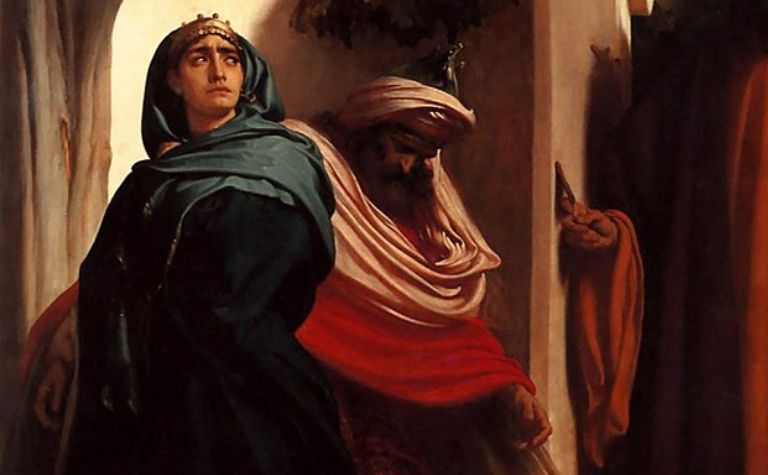In the Bible, the name Jezebel is unflattering. As the wife of Ahab, she is one of the worst characters readers encounter in the Old Testament. And in the New Testament, Jesus himself refers to her when he rebukes a church for its evil ways. Because of these references, many people today associate the name Jezebel with women who are immoral in their character and behavior. But what is a Jezebel Spirit?
A “Jezebel Spirit” refers to the character of a dishonorable woman who leads others astray, especially through sexual immorality. Jezebel refers to the immoral woman mentioned in 1 Kings, who Jesus alludes to in Revelation. In context, “spirit” refers to having the same qualities as someone else.
What made Jezebel so evil in the Bible? Who did she worship? Who did she try to kill? Why did Jesus mention her in Revelation? How do people today, including Pentecostals, use the phrase “Jezebel Spirit”? Keep reading to learn the answers to these questions and others.
Also see What is Spiritual Warfare? to learn more.

Who was Jezebel? Why did Jesus refer to her?
The phrase “Jezebel Spirit” doesn’t appear in the Bible. However, some believe the phrase correctly describes Jesus’ teaching in Revelation 2:20. To the Church in Thyatira, Jesus said, “But I have this against you, that you tolerate that woman Jezebel, who calls herself a prophetess and is teaching and seducing my servants to practice sexual immorality and to eat food sacrificed to idols” (ESV).
Who did Jezebel marry? Jezebel was a Sidonian who married Ahab (874-853 B.C.), the seventh king of the northern kingdom of Israel who reigned for 22 years. 1 Kings 16:31 refers to his marriage, “And as if it had been a light thing for [Ahab] to walk in the sins of Jeroboam the son of Nebat, he took for his wife Jezebel the daughter of Ethbaal king of the Sidonians, and went and served Baal and worshiped him” (ESV).
Who did Jezebel worship? The town of Sidon was known for its idolatry in the Old Testament. Jezebel, like other Sidonians, worshipped the false god, Baal. After Ahab’s marriage to Jezebel, the king built altars to Baal in Samaria (v. 32). This is partly why 1 Kings says that Ahab “did more to provoke the Lord, the God of Israel, to anger than all the kings of Israel who were before him” (v. 33).
Jezebel not only promoted false worship, but she also tried to exterminate godly influences in Israel. For example, Jezebel was so determined to kill God’s prophets that Obadiah had to hide dozens of them in a cave to protect them (1 Kings 18:4). In one story, she invited a curse upon herself, inflicted by her false gods if she couldn’t kill the prophet Elijah in 24 hours (1 Kings 19:1-3).
Also see What Is a Familiar Spirit? to learn more.

What did Jesus say about Jezebel?
In the book of Revelation, chapters 2 and 3, Jesus speaks to seven different churches in the region of Asia Minor, including the one at Thyatira. In his address, Jesus mentioned that a woman who called herself a prophetess refused to repent of her sexual immorality (v. 21) and would suffer the consequences of her actions (v. 22-23). Jesus refers to her as “that woman Jezebel.”
Jesus wasn’t saying the woman was Jezebel, but that she had the same unethical characteristics as Ahab’s wife, who lived 900 to 1,000 years earlier. Another way to express this idea in English is with the phrase “spirit of”; i.e., the prophetess had the “spirit of Jezebel” or a “Jezebel Spirit.” The dictionary definition of “spirit” includes this use of the word: “A person having a character or disposition of a specified nature.” [1]
The Spirit of Jezebel
If someone demonstrates the characteristics that Christmas is known for, like generosity, they are said to have the “spirit of Christmas” or the “Christmas spirit.” Likewise, if something reflects the attributes of a place, the same phrase is sometimes used. For instance, Charles Lindbergh named his famous plane the “Spirit of Saint Louis” after his hometown in Missouri.
Jesus’ way of describing the immoral woman at Thyatira as “Jezebel” became common to the extent that it also appears in dictionaries. Merriam-Webster defines a “Jezebel” as “an impudent, shameless, or morally unrestrained woman.” Similarly, Cambridge Dictionary defines the word as “an immoral woman who deceives people in order to get what she wants.” [2]
Also see What Is Blasphemy Against the Holy Spirit? to learn more.

How do people use the phrase “Jezebel Spirit”?
The intent of the user or speaker is the best way to determine the phrase’s meaning in any given context. While nearly all uses of the name have similarities, like the implication of immorality, some people and traditions use the name in unique ways.
- Some people use the phrase to describe a woman who leads others astray and promotes false teaching. This use of “Jezebel” is the most straightforward reading of Revelation 2:20.
- Some people use the phrase to describe a woman who attempts to lead others astray through sexual immorality. Even though Jesus also mentioned that the prophetess was leading people astray through food sacrificed to idols, some people use the phrase today specifically in relation to sexual temptation and sin.
The word “spirit” in these two examples often refers to similarity, as previously explained. However, one Christian tradition emphasizes a different understanding of the word “spirit.”
Jezebel in the Pentecostal tradition
In the Pentecostal tradition and some charismatic circles, “Jezebel Spirit” sometimes refers to a literal, sinister immaterial being. However, in contrast to the use of “spirit” as a reference to having the same characteristics as someone else, the other use employs another common meaning of the word: a supernatural being.
To some, this means that a woman who attempts to lead Christians astray, primarily through sexual immorality, has an evil spirit or demon. The woman in Thyatira called herself a prophetess, according to Jesus, which likely conveys that she demonstrated supernatural ability. However, the nature of her supernatural activity was demonic, not godly.
Also see What Are the 12 Gifts of the Holy Spirit? to learn more.
References:
[1] Source
[2] Source
Related Questions
One day when Jesus was passing through Samaria, he sat down beside a well because he was tired. There, he met a woman who came to draw water and struck up a conversation with her that eventually...
The Bible is full of descriptions of the Holy Spirit's nature and works, from Genesis to Revelation, making it clear that the third person of the Trinity is active in the lives of Christians....
